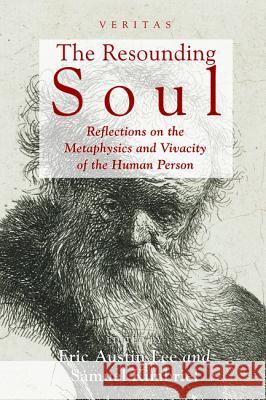The Resounding Soul » książka
The Resounding Soul
ISBN-13: 9781498232074 / Angielski / Miękka / 2015 / 424 str.
The Resounding Soul
ISBN-13: 9781498232074 / Angielski / Miękka / 2015 / 424 str.
(netto: 187,17 VAT: 5%)
Najniższa cena z 30 dni: 193,85
ok. 16-18 dni roboczych.
Darmowa dostawa!
It is surely not coincidental that the term ""soul"" should mean not only the center of a creature's life and consciousness, but also a thing or action characterized by intense vivacity (""that bike's got soul ""). It also seems far from coincidental that the same contemporary academic discussions that have largely cast aside the language of ""soul"" in their quest to define the character of human mental life should themselves be so--how to say it?--bloodless, so lacking in soul. This volume arises from the opposite premise, namely that the task of understanding human nature is bound up with and in important respects dependent upon the more critical task of learning to be fully human, of learning to have soul. The papers collected here are derived from a conference in Oxford sponsored by the Centre of Theology and Philosophy and together explore the often surprising landscape that emerges when human consciousness is approached from this angle. Drawing upon literary, philosophical, theological, historical, and musical modes of analysis, the essays of this volume vividly remind the reader of the power of the ancient language of soul over against contemporary impulses to reduce, fragment, and overly determine human selfhood. ""According to Aristotle, inquiry into the soul is one of the noblest human tasks. Such an inquiry, however, has all but disappeared: if the soul is not denied altogether, it is rarely thought about. The Resounding Soul helps us recollect this ancient knowledge, and at the same time opens up new avenues of reflection. By inviting us to lift our gaze in this bourgeois and pragmatic age, the editors have rendered a great service."" --D. C. Schindler, author, Associate Professor of Metaphysics and Anthropology, The John Paul II Institute ""These exacting essays variously suggest that the apparently problematic category of the soul nonetheless secures the reality of mind without reduction, and without a dualistic contrast to body and matter. Both body and mind live, and it is the living force of the soul which combines them in growth, motion and reflection."" --Catherine Pickstock Professor of Metaphysics and Poetics, Emmanuel College, University of Cambridge Eric Austin Lee (PhD) is Research Fellow/Deputy Director, North America at the Centre of Theology and Philosophy, University of Nottingham, where he also received his PhD. He is coeditor of the Veritas and KALOS book series. Samuel Kimbriel (MPhil; PhD) is a Teaching Fellow in philosophical theology at the University of Nottingham. He is the author of Friendship as Sacred Knowing: Overcoming Isolation (2014).
It is surely not coincidental that the term ""soul"" should mean not only the center of a creatures life and consciousness, but also a thing or action characterized by intense vivacity (""that bikes got soul!""). It also seems far from coincidental that the same contemporary academic discussions that have largely cast aside the language of ""soul"" in their quest to define the character of human mental life should themselves be so--how to say it?--bloodless, so lacking in soul. This volume arises from the opposite premise, namely that the task of understanding human nature is bound up with and in important respects dependent upon the more critical task of learning to be fully human, of learning to have soul. The papers collected here are derived from a conference in Oxford sponsored by the Centre of Theology and Philosophy and together explore the often surprising landscape that emerges when human consciousness is approached from this angle. Drawing upon literary, philosophical, theological, historical, and musical modes of analysis, the essays of this volume vividly remind the reader of the power of the ancient language of soul over against contemporary impulses to reduce, fragment, and overly determine human selfhood.""According to Aristotle, inquiry into the soul is one of the noblest human tasks. Such an inquiry, however, has all but disappeared: if the soul is not denied altogether, it is rarely thought about. The Resounding Soul helps us recollect this ancient knowledge, and at the same time opens up new avenues of reflection. By inviting us to lift our gaze in this bourgeois and pragmatic age, the editors have rendered a great service.""--D. C. Schindler, author, Associate Professor of Metaphysics and Anthropology, The John Paul II Institute""These exacting essays variously suggest that the apparently problematic category of the soul nonetheless secures the reality of mind without reduction, and without a dualistic contrast to body and matter. Both body and mind live, and it is the living force of the soul which combines them in growth, motion and reflection.""--Catherine Pickstock Professor of Metaphysics and Poetics, Emmanuel College, University of CambridgeEric Austin Lee (PhD) is Research Fellow/Deputy Director, North America at the Centre of Theology and Philosophy, University of Nottingham, where he also received his PhD. He is coeditor of the Veritas and KALOS book series.Samuel Kimbriel (MPhil; PhD) is a Teaching Fellow in philosophical theology at the University of Nottingham. He is the author of Friendship as Sacred Knowing: Overcoming Isolation (2014).











